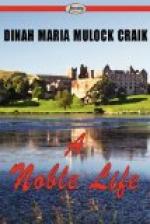“‘Try’ ought to be the motto of the Cardross arms—of yours certainly,” said Lord Cairnforth, smiling. “I should like to assume it on mine, instead of my own ‘Virtute et fide,’ which is of little use to me. How can I—I—be brave or faithful?”
“You can be both—and you will,” said Helen, softly. Years from that day she remembered what she had said, and how true it was.
A little while afterward, while the minister still remained buried in his beloved books, Lord Carinforth recurred again to Dougal Mac Dougal.
“The old fellow was right. If I am ever to have ‘ony wits ava,’ I ought to have them by this time. I am nearly twenty-one. Any other young man would have been a man long ago. And I will be a man—why should I not? True manliness is not solely outside. I dare say you could find many a fool and a coward six feet high.”
“Yes,” answered Helen, all she could find to say.
“And if I have nothing else, I have brains—quite as good brains, I think, as my neighbors. They can not say of me now that I’m ‘no a’ there.’ Nay, Helen, don’t look so fierce; they meant me no ill; it was but natural. Yes, God has left me something to be thankful for.”
The earl lifted his head—the only part of his frame which he could move freely, and his eyes flashed under his broad brows. Thoroughly manly brows they were, wherein any acute observer might trace that clear sound sense, active energy, and indomitable perseverance which make the real man, and lacking which the “brawest” young follow alive is a mere body—and animal wanting the soul.
“I wonder how I should set about managing my property. The duty will not be as easy for me as for most people, you know,” added he, sadly; “still, if I had a secretary—a thorough man of business, to teach me all about business, and to be constantly at my side, perhaps I might be able to accomplish it. And I might drive about the country—driving is less painful to me now—and get acquainted with my people; see what they wanted, and how I could best help them. They would get used to me, too. I might turn out to be a very respectable laird, and become interested in the improvement of my estates.”
“There is great opportunity for that, I know,” replied Helen. And then she told him of a conversation she had heard between her father and Mr. Menteith, when the latter had spoken of great changes impending over quiet Cairnforth: how a steamer was to begin plying up and down the loch —how there were continual applications for land to be feued—and how all these improvements would of necessity require the owner of the soil to take many a step unknown to and undreamed of by his forefathers —to make roads, reclaim hill and moorland, build new farms, churches, and school-houses.
“In short, as Mr. Menteith said, the world is changing so fast that the present Earl of Cairnforth will have any thing but the easy life of his father and grandfather.




